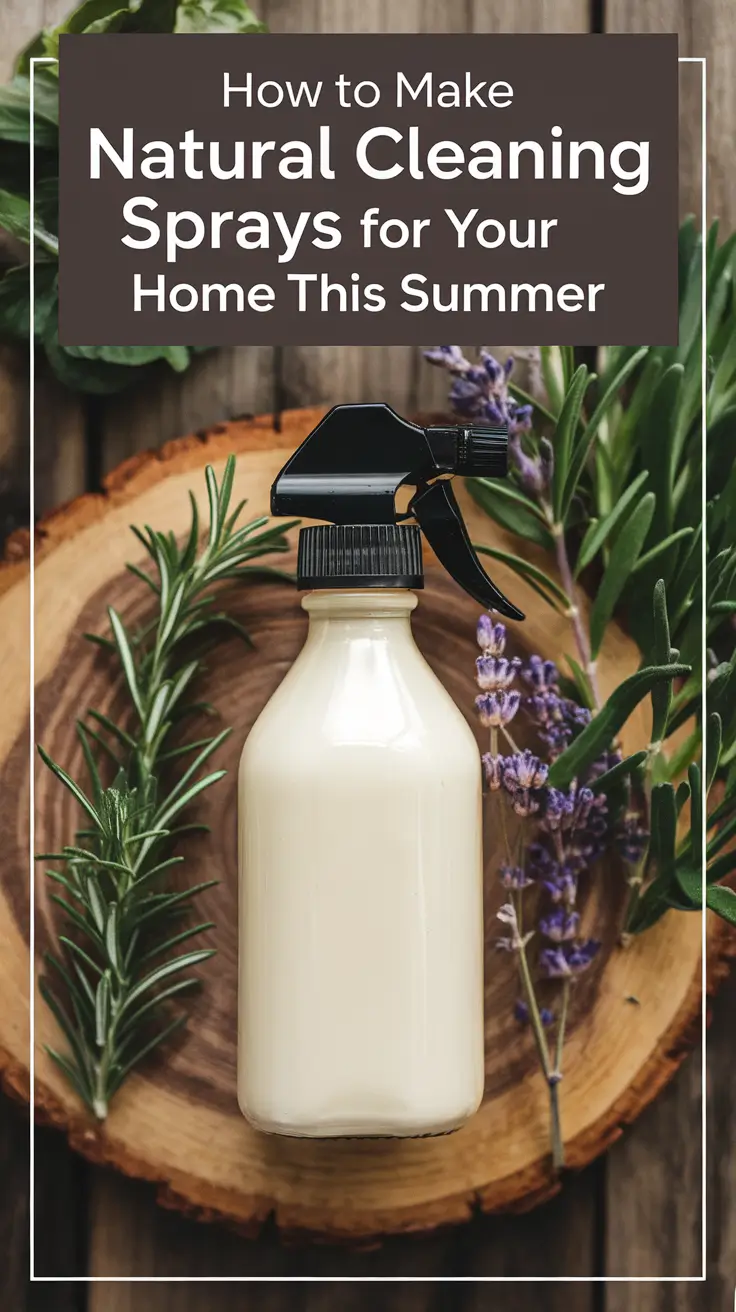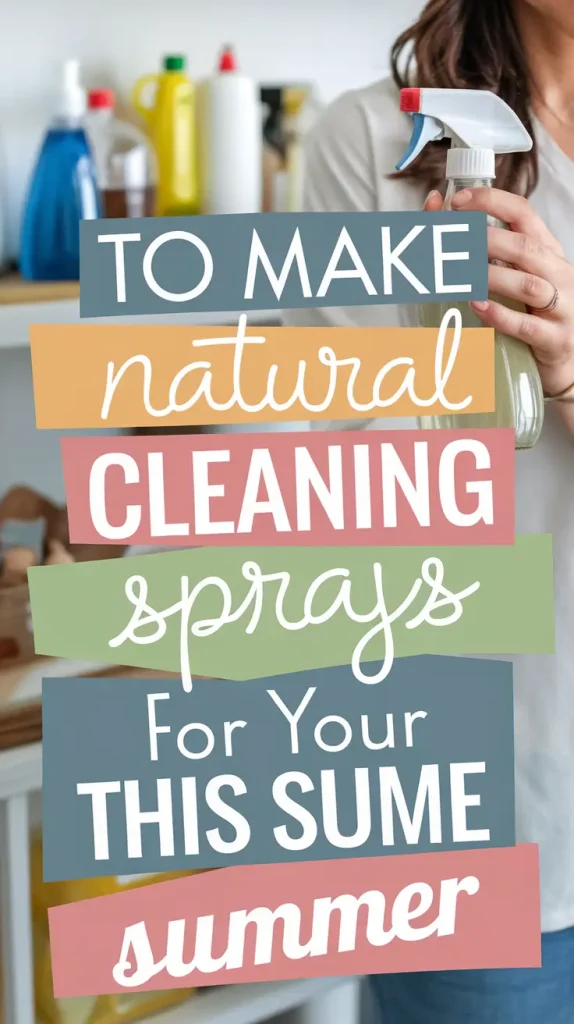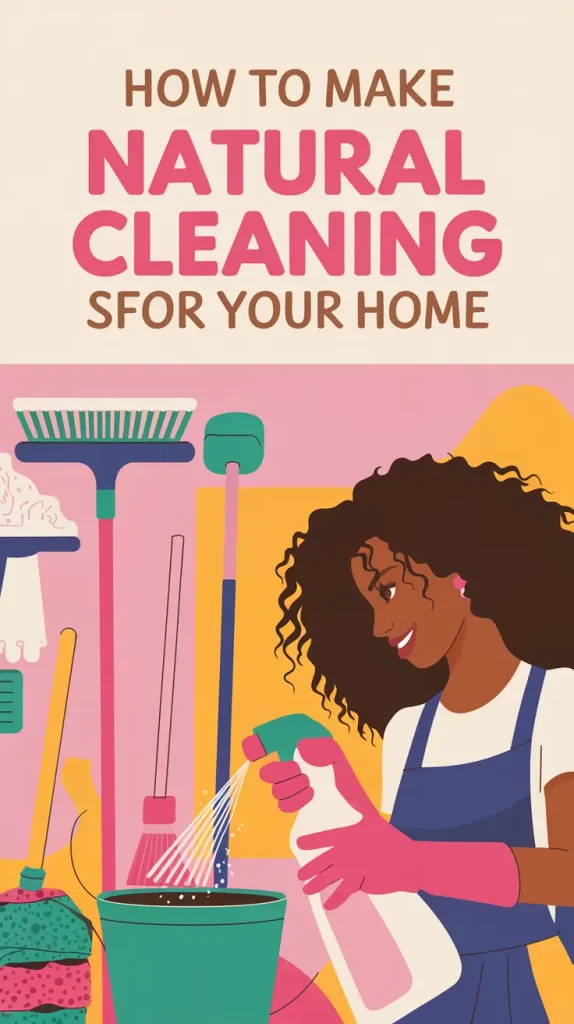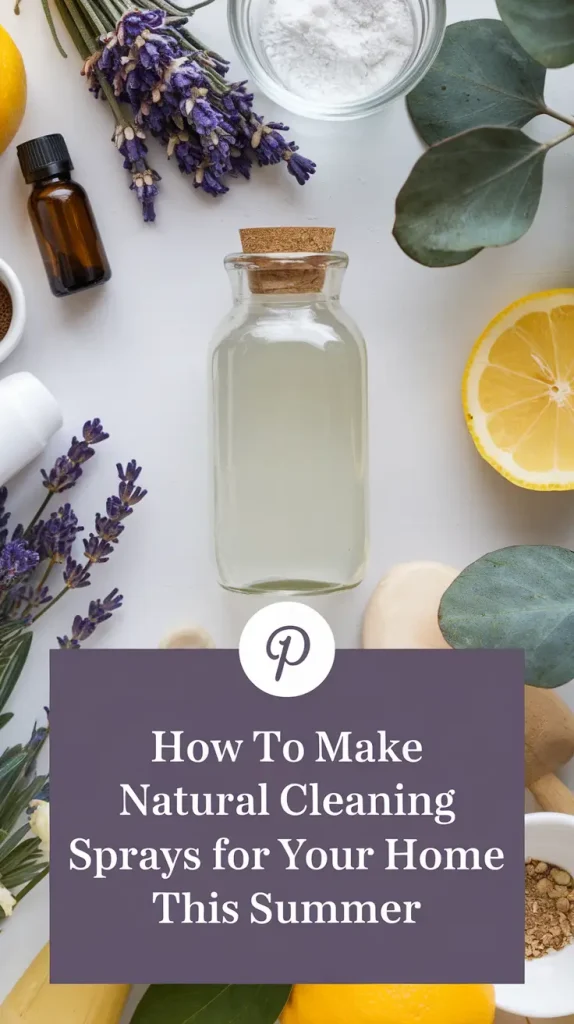How to Make Natural Cleaning Sprays for Your Home This Summer

I realized it one afternoon after I finished scrubbing the counters and went into the kitchen. The place was perfectly clean, but the air was so thick it felt like a cloud of lemon-scented static. Not refreshing. Not relaxing. Just… off.
If you’ve ever cleaned your home only to find yourself opening the windows not for fresh air but to escape the after-smell, you’re not alone. Most store cleaners are effective, but they also leave behind a mix of fake fragrance and a strong chemical odor.
This summer, I made a shift that changed not just how my home looks, but how it feels. In this post, I’ll share how I started making natural cleaning sprays, what worked, what didn’t, and how you can create your own blends that feel like a breath of fresh (real) air.

Why summer is the perfect time to go natural
I didn’t expect this: cleaning in the summer feels different somehow. When it’s hot, everything seems stronger — the smell of the cleaners, the sweat on your back and the need to clean and rinse quickly.
The seasonal reality
- Warm air intensifies chemical smells
- Windows stay closed because of AC — so air circulates less
- Kids and pets spend more time indoors — closer to floors and surfaces
I realized that every time I used a commercial spray, I was basically spritzing synthetic particles into the heat, sealing them in, and calling it “clean.” That’s when I started thinking: What if my home could smell like real citrus, not lab-made lemon?
Natural sprays aren’t just a “green” trend. In the summer, they’re a functional choice: lighter on the lungs, safer for barefoot steps and curious noses, and surprisingly effective when made right.
My go-to trio: the only 3 ingredients you really need
It started with a deep dive into DIY blogs and Pinterest rabbit holes. What I found was encouraging: you don’t need a full apothecary to make effective natural sprays.
Here’s what actually worked:
- White vinegar – The powerhouse. Cuts grease, disinfects, neutralizes odors.
- Baking soda – Gentle scrubber and smell-buster. I don’t mix it in the spray, but it’s a great pre-step.
- Essential oils – The soul of your spray. A few drops go a long way to uplift your mood and add antimicrobial benefits.
💡 Tip: Start with lemon, tea tree, or lavender. They blend beautifully and cover a wide range of cleaning needs.
And yes, you can find all three at your local grocery store. No obscure powders or complicated conversions.
My step-by-step recipe for a multipurpose summer spray
Let me show you how that worked out in my actual kitchen. I tried a few combinations, but this one became my everyday staple — safe enough for the counter, bold enough for the bathroom.
4 easy steps to mix your own cleaner:
- Fill a clean spray bottle halfway with white vinegar
- Add equal parts water (filtered if you have it)
- Drop in 10–15 drops of essential oil — lemon for freshness, lavender for calm, or tea tree for power
- Shake gently and label (trust me, you’ll forget which is which by week two)
I keep one labeled “Citrus Clean” on the kitchen shelf and another — “Lavender Calm” — in the bathroom. It’s weirdly satisfying, like having signature scents for your rooms.
Where it works (and where it doesn’t)
This is where it all shifted for me. I used to think natural meant “less effective.” But I tested this spray everywhere — and here’s what I found.

It’s perfect for:
- Stainless steel sinks
- Ceramic tile and backsplash
- Mirrors and windows (with a dry microfiber wipe)
- Fridge shelves and door handles
- Bathroom surfaces (even the toilet seat)
A few quick caveats:
- Don’t use it on marble or natural stone — vinegar can etch the surface
- Avoid wood that’s unfinished or waxed — it might dry it out
- Store it in a dark bottle or cool space — oils degrade in sunlight
🌿 Bonus: I even lightly mist fabric surfaces like my couch and curtains (just do a spot test first). Lavender-mint is a game changer on summer evenings.
Natural vs. Store-Bought: A Practical Comparison
I didn’t switch for the trend. I switched because I wanted a home that felt cleaner — in the air, on my skin, around my dog. And it helped to see it laid out clearly:
| Feature | Natural Cleaning Spray | Commercial Spray |
|---|---|---|
| Ingredients | Vinegar, water, essential oils | Ammonia, fragrance, preservatives |
| Safety | ✅ Kid/pet friendly (when diluted) | ⚠️ Often requires glove use |
| Smell | Custom, fresh, gentle | Strong, synthetic, lingering |
| Cost per bottle | <$1 | $4–$10 |
| Environmental impact | Biodegradable, refillable bottle | Single-use plastic, toxic runoff |
| Effectiveness | Great for daily cleaning | Stronger on heavy-duty messes |
What not to do (because I’ve made the mistakes)
Here’s the part I thought I had figured out — and totally didn’t. I went overboard with oils once and ended up with a slick countertop. Another time, I mixed baking soda into the spray. Spoiler: it exploded.
Here’s what to avoid:
- Too much essential oil = greasy residue and headaches
- Mixing vinegar + baking soda in a bottle = fizzy volcano
- Skipping the label = mystery smells and repeat mistakes
- Making huge batches = essential oils fade after a few weeks
🧴 Better approach: Make small, weekly batches. It keeps the scent fresh and the spray effective.
My favorite scent combos for different moods
Scent is emotional. It can lift you, ground you, even motivate you to clean. Once I started playing with blends, I realized I could match the mood of a space, not just clean it.
Top summer blends I use:
- 🍋 Lemon + Peppermint – crisp and energizing. I use it in the kitchen before guests come over.
- 🌸 Lavender + Orange – floral and cozy. Great for winding down the evening.
- 🌿 Eucalyptus + Rosemary – spa-like, earthy. My favorite post-shower spritz.
💧 Optional tip: Add a splash of vodka (yes, really) to help oils disperse better and to boost disinfecting power.
Would you ever try mixing your own scent? It’s addictive — in a good way.
How it actually changed my home life
This wasn’t just about ingredients. I noticed a difference when I began using lavender water instead of chemicals. I slowed down. I noticed my space more. I started to see cleaning as a way to refresh myself.
There’s something pleasant about wiping a counter that actually smells like lemons, not just a fake lemon scent. There’s pride in knowing exactly what’s inside that bottle. Really, it feels good to choose just one thing from the shelf and think, “I can do better.”
Final thoughts
I didn’t plan on becoming a DIY cleaner girl. I just wanted my home to smell better. However, these natural sprays fit easily into my summer routine — they were light, fresh and always uplifting.
If you’re craving a reset this season, start small. One bottle, one blend, one spray across your sink. It’s simple, quick, and a little magical.
If you’re getting ready for a new season, remember to pin this.
What is a change you’ve made in your home that made everything seem brighter?

